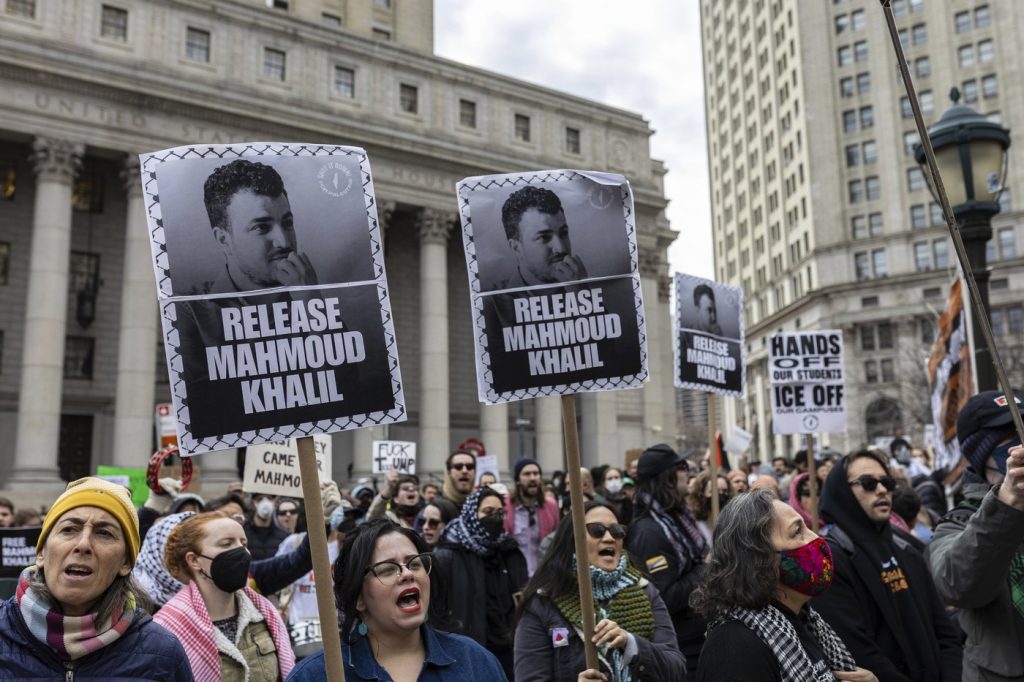BOSTON (AP) - A federal bench trial commenced on Monday regarding a lawsuit that contests a Trump administration initiative aimed at arresting and deporting faculty and students involved in pro-Palestinian demonstrations and other political activities. The lawsuit, brought forth by several university associations against former President Donald Trump and members of his administration, stands out as one of the initial cases proceeding to trial.
The plaintiffs are requesting U.S. District Judge William Young to declare that the policy infringes upon the First Amendment rights and violates the Administrative Procedure Act, a statute that regulates how federal agencies formulate and enact regulations.
The plaintiffs expressed in their pretrial brief, “The policy’s effects have been swift. Noncitizen students and faculty across the United States have been terrified into silence.” They elaborated that students and faculty are shunning political protests, purging their social media accounts, and withdrawing from public involvement with groups advocating pro-Palestinian perspectives. Furthermore, they noted that individuals are refraining from certain public writings and scholarly pursuits they would typically engage in, leading to self-censorship even within classroom settings.
Several academic professionals are anticipated to testify about how the policy and the resulting arrests have deterred them from advocating for Palestinian human rights and critiquing Israeli governmental policies.
Since Trump took office, the U.S. government has employed its immigration enforcement authority to intensify a crackdown on international students and scholars at multiple American universities. Trump and other officials have alleged that demonstrators and others hold “pro-Hamas” sentiments, linking them to the Palestinian militant group that launched an attack on Israel on October 7, 2023. Many protesters contend that their actions are a response to Israel’s conduct during the ongoing conflict.
The lawsuit specifically names activists such as Mahmoud Khalil, a Palestinian activist and Columbia University graduate who was released last month after spending 104 days in federal immigration detention. Khalil’s situation has become emblematic of Trump’s crackdown on campus protests. Additionally, the case mentions Rumeysa Ozturk, a Tufts University student who was released in May after spending six weeks in a Louisiana immigration detention center following her arrest while walking in a Boston suburb. Ozturk alleges her detention was unjust following an op-ed she co-authored that critiqued her university’s response to the war in Gaza.
Plaintiffs assert that the Trump administration provided universities with names of individuals they aimed to target and engaged in social media surveillance. They also cite Trump’s statement following Khalil’s arrest, in which he declared it the “first arrest of many to come.”
In contrast, the government argues in court filings that the plaintiffs are challenging a policy they themselves created, asserting that they have failed to ground this supposed policy in any statute, regulation, or directive. The government contends, “They do not even try to identify its specific terms and substance,” and claims that no such policy exists. Furthermore, they argue that the plaintiffs’ case is based on a misunderstanding of the First Amendment, which they assert is applied differently within the context of immigration than it is domestically.
However, the plaintiffs counter that trial evidence will demonstrate that the Trump administration has implemented the policy in several forms, ranging from formal guidance on visa and green card revocations to establishing mechanisms for identifying individuals engaged in pro-Palestinian protests. Plaintiffs noted, “Defendants have described their policy, defended it, and taken political credit for it. It is only now that the policy has been challenged that they say, incredibly, that the policy does not actually exist.” They assert that the evidence presented during the trial will definitively establish the policy's existence.










